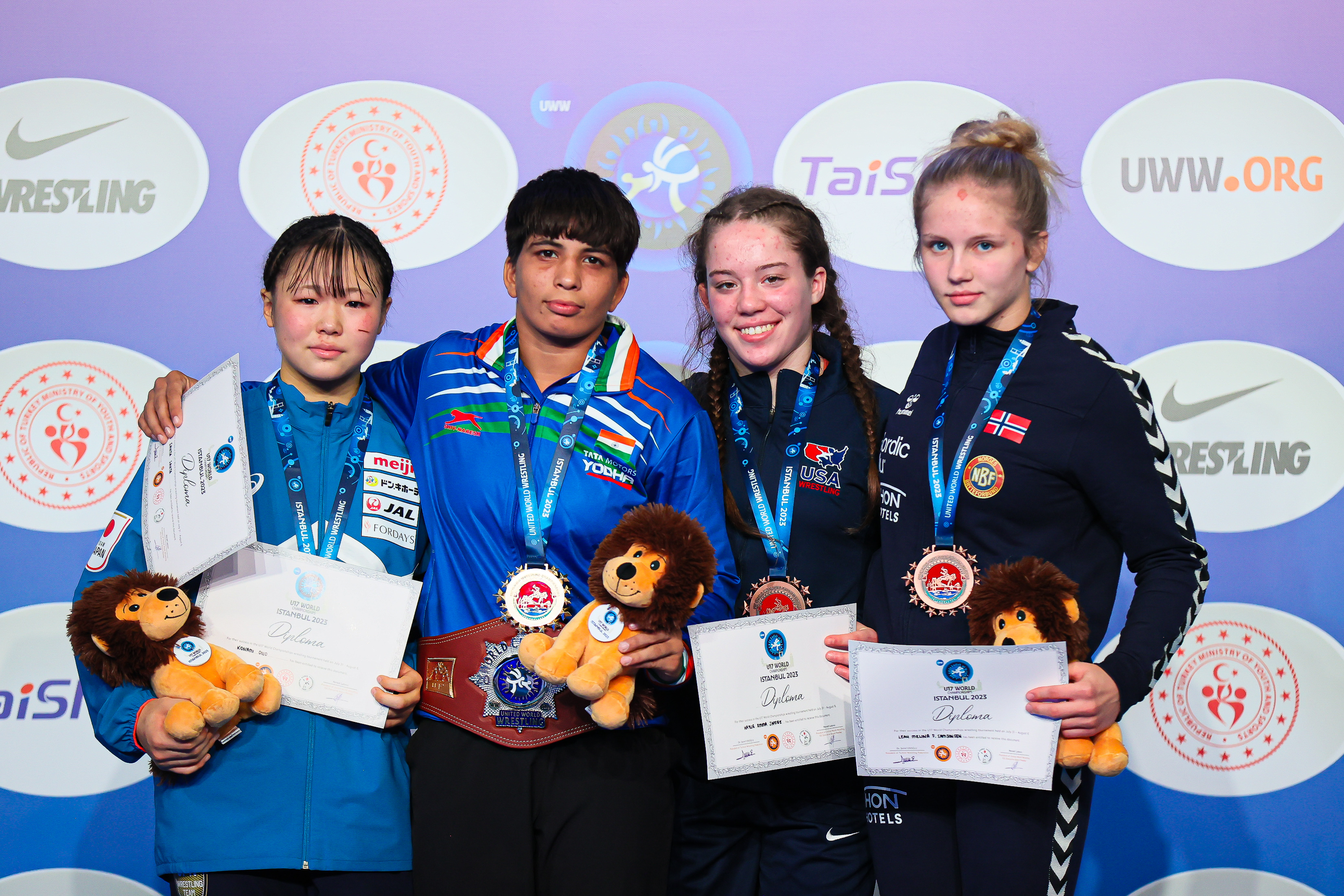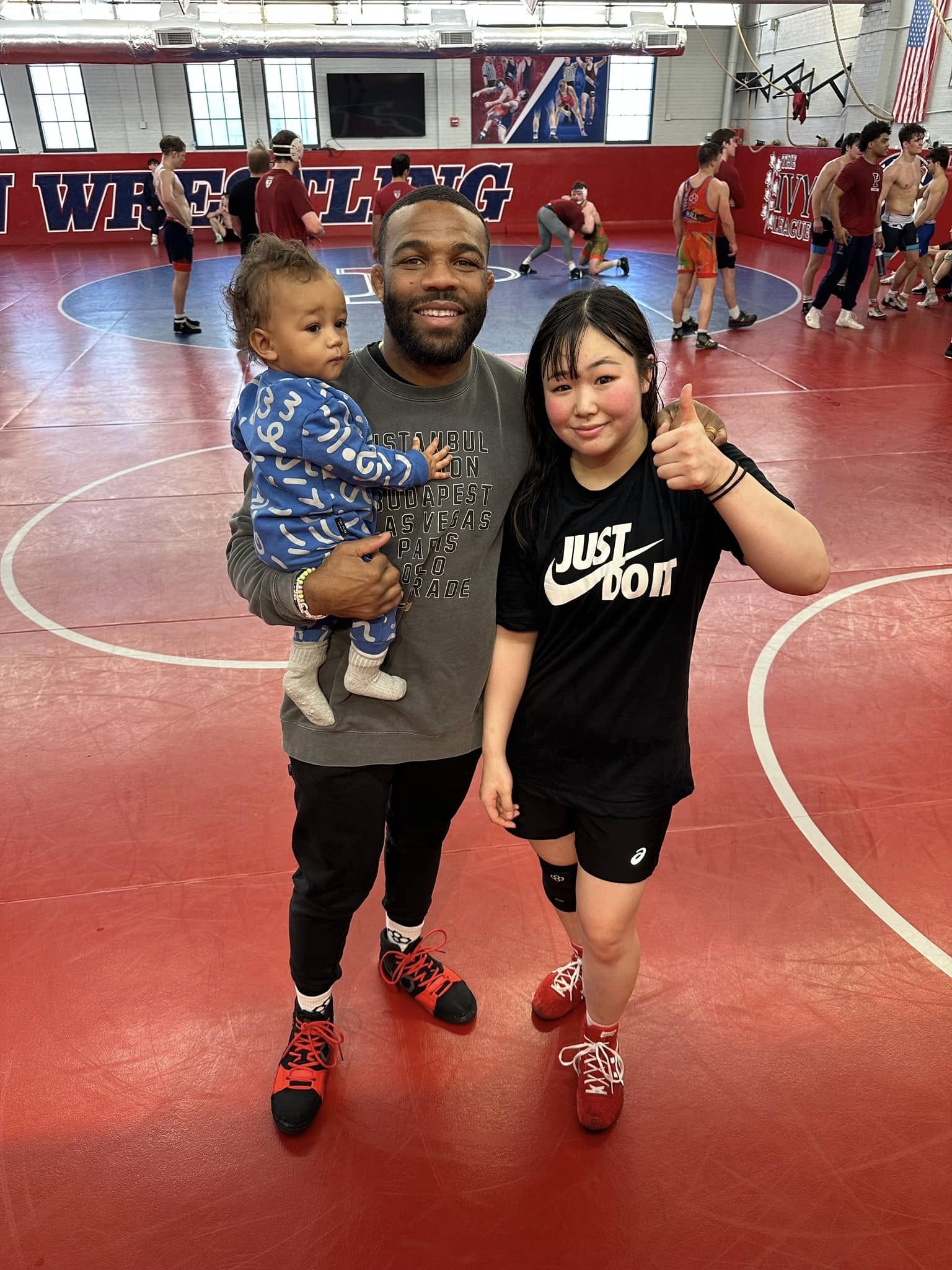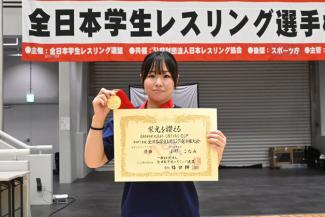TOKYO (August 27) -- When you think of the name Ono from Shimane Prefecture, many will recall Masanosuke ONO (JPN), a world champion who is quickly becoming a global star, who now primarily competes in the United States.
Ono's younger sister Konami, who was undefeated in the national tournament during her elementary school years, is just like her brother. She went on to attend Nippon Sport Science University Ohka High School in Tokyo, where she grew up steadily, winning the Inter-High School Championships in 2023 and also winning silver at the U17 World Championships the same year.
A shoulder injury caused her to slow down, but through repeated practice at Nippon Sport Science University she regained her former strength and won the East Japan Student Championships and the All Japan Amateur Championships [women's competition is open to university students as well] last week.
 Konami ONO (JPN), left, won a silver medal at the 2023 U17 World Championships. (Photo: United World Wrestling / Kadir Caliskan)
Konami ONO (JPN), left, won a silver medal at the 2023 U17 World Championships. (Photo: United World Wrestling / Kadir Caliskan)
Being coached by 2004 Athens Olympic bronze medalist Chikara TANABE and Kaori ICHO, she described herself as being in "the best environment."
Ono had been suffering from pain in the right shoulder and had to undergo a surgery in June last year. She had initially aimed for a comeback last year at the All Japan Championships [Emperor's Cup] in December, but was forced to withdraw. She returned to competition in April of this year at the Junior Queen's Cup U20, where she won one match, but lost the next match to a junior from high school by technical superiority.
"There were times when my shoulder would dislocate just by walking. It was a frustrating year," said Ono with her voice becoming teary, as if the pain had returned. "I'm happy because I was injured and couldn't wrestle for a while," she said but added, "I realized I need to practice more and get stronger."
Inspiration from brother Ono
While she was off the mat, Konami watched her brother Masanosuke win the gold medal at the U20 World Championships in 2024 and later become the world champion at 61kg at the Non-Olympic World Championships.
"It's not something I could ever imitate," she says, and although he is someone she should "admire" rather than "target," he is also someone close to her, having competed alongside since childhood. "I want to study hard and catch up," she says.
 Konami ONO (JPN) with world and Olympic champion Jordan BURROUGHS (USA). (Photo courtesy: Masaharu Ono)
Konami ONO (JPN) with world and Olympic champion Jordan BURROUGHS (USA). (Photo courtesy: Masaharu Ono)
Earlier in spring, Konami accompanied her older brother to the United States, where he trains at Pennsylvania State University. She was still recovering and was unable to train, but she watched her brother's win against 2024 Paris Olympic silver medalist Spencer LEE (USA).
"I thought American wrestling was really amazing. It was inspiring," she said.
What made the biggest impression on Konami was how much fun her brother seemed to be having wrestling, even though he was in a foreign country.
"He really enjoys wrestling," she said. "I was amazed that there are people who love wrestling that much [laughs].
"My brother is my role model," she said. "I often watch his techniques and aspire to be like him."
What she finds particularly impressive is his speed, and the way he unconsciously develops his techniques. She herself sometimes has trouble deciding what to do next during a match, but her brother's body moves without a second thought. "I need to be able to come out with techniques one after the other," she said.



 Konami ONO (JPN), left, won a silver medal at the 2023 U17 World Championships. (Photo: United World Wrestling / Kadir Caliskan)
Konami ONO (JPN), left, won a silver medal at the 2023 U17 World Championships. (Photo: United World Wrestling / Kadir Caliskan) Konami ONO (JPN) with world and Olympic champion Jordan BURROUGHS (USA). (Photo courtesy: Masaharu Ono)
Konami ONO (JPN) with world and Olympic champion Jordan BURROUGHS (USA). (Photo courtesy: Masaharu Ono)
Share your thoughts.
Comments